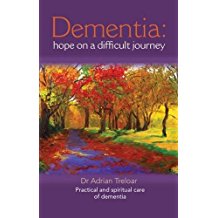By Anne Forbes, Trustee
 One November evening some years ago my 93-year old father fell in his bedroom, fracturing his hip and collar bone. Excellent emergency care ensured that a week later, sitting up in hospital, he welcomed my daily visit and the local evening paper. He was less pleased however when he spotted the paper’s date, asking why I had brought a November newspaper when we were now in February… It was my first indication that the dementia which his mother had experienced was now manifesting itself in the son, possibly exacerbated by the recent anaesthetics. What I would have appreciated at that time was a copy of Adrian Treloar’s recent book Dementia: Hope on a difficult journey.
One November evening some years ago my 93-year old father fell in his bedroom, fracturing his hip and collar bone. Excellent emergency care ensured that a week later, sitting up in hospital, he welcomed my daily visit and the local evening paper. He was less pleased however when he spotted the paper’s date, asking why I had brought a November newspaper when we were now in February… It was my first indication that the dementia which his mother had experienced was now manifesting itself in the son, possibly exacerbated by the recent anaesthetics. What I would have appreciated at that time was a copy of Adrian Treloar’s recent book Dementia: Hope on a difficult journey.
Dr Treloar is a consultant and senior lecturer in old-age psychiatry who has been developing and running services for people at all stages and severities of dementia for over twenty years. He is also a Catholic, so this helpful book of 29 short chapters is divided into those which concentrate on Practical Care and those which are concerned with Spiritual Care. Both sections are clearly presented, with an attractive readable typeface, and unusual illustrations, both paintings and photographs (but with few credits).
The chapters on Practical Care cover issues which can be found in many other dementia-information publications, but are succinctly explained with headings such as: What is Dementia? Medical treatments; Planning and Thinking about the Future; Ways of Communicating; Memories; Preparing a Life Story Book; Palliative Care, and others. These are prefaced by an interesting introduction which raises questions about the pros and cons of longer life – whether the joys of living to see one’s grandchildren grow up are offset by the illnesses which beset us in later years.
However, the most original chapters are those which concentrate on Spiritual Care. Although Dr Treloar is a Catholic, he hopes that these will be of value to people of all faith backgrounds. This section of the book begins as follows:
‘Dementia is often seen as a medical illness. But it is much more than that. Most of all, dementia is a social and spiritual illness; it is, for everyone, about a profound change in life and also part of a journey towards God. So if we neglect the spiritual dimension, then we fail our patients and loved ones’ (p101).
The section is preceded by chapters on Sin, Despair, and Hope, topics not usually found in dementia manuals. These stress the importance of finding out about a person’s faith background as early as possible, and suggest ways in which people can be supported in sustaining their lifelong beliefs. (Again I was reminded of my own experience with my father whose subsequent agitation could often be calmed by praying the rosary together in the evening, a custom he had learnt as a child is in rural Ireland). Almost all faith traditions have prayers, hymns and customs which can be recognised by people with dementia who have become familiar with these in earlier life; even the wearing of certain symbols, such as a crucifix, may be helpful. Treloar gives examples of Catholic sacramental practice and prayers, but whose example can be of value to others.
Towards the end of the book, Treloar has a chapter entitled ‘Supporting the faith of earlier life – Not the time for conversion’, whose title speaks for itself. Indeed, the whole book offers information for people of all religious faiths as well as for atheists, many of whom may have to go on this difficult journey at some time, and those may find themselves owing a debt of gratitude to Dr Treloar for his wise advice.
Dementia: Hope on a difficult journey by Dr Adrian Treloar is published by Redemptorist Publications http://www.rpbooks.co.uk/products/1734/dementia-hope-on-a-difficult-journey (2016, Redemptorist Publications, £9.95, ISBN 9780852314715).
